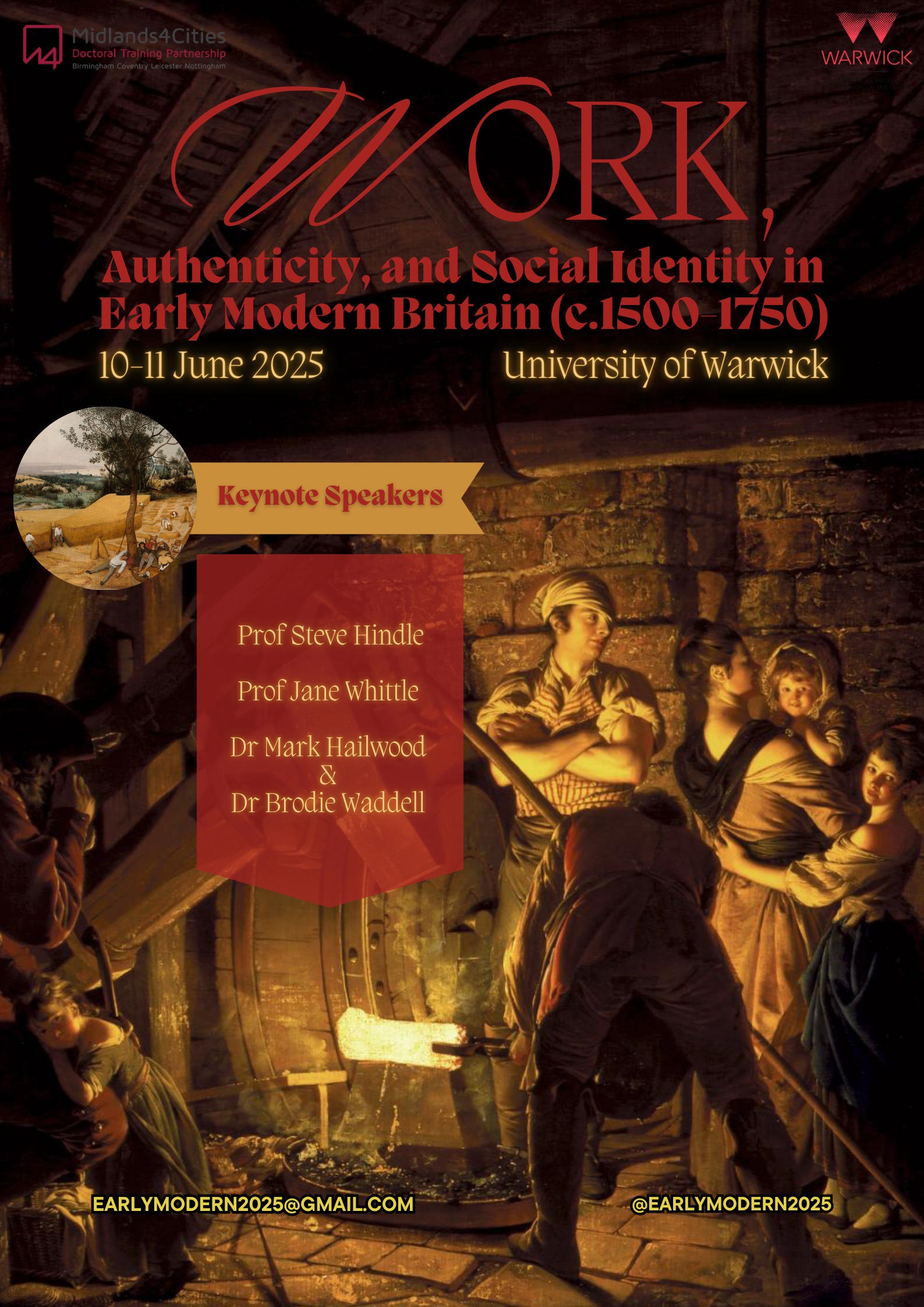received from the event organisers
We are pleased to announce that the Work, Authenticity, and Social Identity in Early Modern Britain (c.1500-1750) Conference, supported by the Warwick Early Modern and Eighteenth Century Centre, the Doctoral Training Partnership AHRC-Midlands4Cities, the Society for the Study of Labour History, the Social History Society, and the Past & Present Society, will take place in the Scarman Conference Centre at the University of Warwick on 10-11 June 2025.
Keynote addresses will be delivered by Professor Steve Hindle (Washington University in St Louis), Professor Jane Whittle (University of Exeter), and jointly by Dr Mark Hailwood (University of Bristol) & Dr Brodie Waddell (Birkbeck, University of London).
Over the past several decades, scholars of British social and cultural history have fundamentally reshaped our understanding of early modern labour, social identity, and the self, demonstrating the analytical power of incorporating interdisciplinary approaches into their analyses alongside a diverse range of sources, from ballads to legal records. This conference seeks to develop this important body of work, inviting fresh perspectives on themes that have proven foundational to the study of early modern British social and cultural history. Non-elite early modern people spent a large portion of their lives ‘at work’, and their labouring experiences were often a central component of their identities and mental universes. We are interested in further unpacking these intersections between labour and identity, as well as the sociopolitical significance of how such relationships were communicated to individuals and communities—what we have capaciously termed ‘authenticity’ here, in hopes of prompting a variety of interpretations and responses.
Registration is essential! If you are interested in attending as a non-speaker, please contact Anna Pravdica at EarlyModern2025@gmail.com
Organised by Anna Pravdica (University of Warwick), Angus Crawford (University of Warwick), and Daniel Muddimer (University of Birmingham)
Programme
Day One, 10 June
8.00-9.25 Registration & Coffee
9.25-9.30 Welcome & Introduction
9.30-11.10 Panel 1 – Craftsmen, Trade, & Regulation
Bernard Capp (University of Warwick), Craft Identities: Collective Assertion and Personal Rejection
Owen Adams (University of Bristol), Defending the Myne: Maintaining Mining Autonomy and Livelihoods in the Forest of Dean from 1612
Anna Pravdica (University of Warwick), Representations of Labour: Economic Deceit and Social Subversion in Seventeenth-Century England
Ed Legon (Queen Mary, University of London), True or False: Authenticity and the Politics of Regulation in the Seventeenth-Century Textile Industry
11.10-12.30 Keynote Address
Steve Hindle (Washington University in St. Louis), The Tools and the Job: The Material Culture of Labour in Early Modern England
12.30-13.30 Lunch
13.30-15.10 Panel 2 – Religion & Nonconformity
Amy Stanning (Lancaster University), Catholic Participation in Civil Administration: The Surprising Case of the Land Tax in Lancashire
Daniel Muddimer (University of Birmingham), Catholic Royalist Activism and Authenticity
Evie Nash (University of Warwick), Shaping the Vagrant: Definitions of Vagrancy in Early Quaker ‘Sufferings’
Peter Lake (Vanderbilt University), Puritanism and Work
15.10-15.30 Coffee Break
15.30-17.10 Panel 3 – Music, Literature, & Performance
Noah Millstone (University of Birmingham), Reading as Labour in Early Modern Europe
Valentino Placanica (University of Bologna), ‘Because Musicians Have No Gold for Sounding’: Musicians, Migration, and Social Identity in Early Modern England, Between Craft and Performance
Yuqi Jiang (University of Birmingham), (Dis)crediting Old Wives’ Tales: Biblical and Classical Allusions in George Peele’s Play The Old Wives’ Tale (1595)
Angela McShane (University of Warwick), Women at Work in the Ballad Trade in Seventeenth-Century England
17.10-17.30 Coffee Break
17.30-18.50 Panel 4 – Gender, Domesticity, & Neighbourhood
Naomi Pullin (University of Warwick), Solitary Work and the Labour of Solitude
Abigail Carr (University of Leicester), Wet Nursing, Marital Status, and Familial Relationships in the Early Eighteenth Century
Alasdair McNeill (Birkbeck, University of London), Cheesemaking, Community, and Identity in Eighteenth-Century England
19.00-21.00 Conference Dinner
Day Two, 11 June
8.00-9.25 Breakfast & Coffee
9.25-9.30 Welcome & Introduction
9.30-10.50 Panel 5 – Poverty, Poor Relief, & Belonging
Ian Archer (University of Oxford), Pauper Apprenticeship in Early Modern London
Grace Marshall (Birkbeck, University of London), Disability and Physical Difference in Early Modern England
Naomi Tadmor (Lancaster University), Settlement and Identity, c.1662-1697
10.50-12.10 Keynote Address
Jane Whittle (University of Exeter), Housework as the Performance of Status in Early Modern England
12.10-13.10 Lunch
13.10-14.30 Panel 6 – Masculinity & Martial Identities
Joshua Racey (University College London), Social and Economic Effects of Garrisoning in the Reign of James II
Dylan Neill Andres (University of Bristol), Gender, Class, and Labour in the Popular Construction of the Martial Self
Melissa Glass (University of Calgary), Major George Strangeways versus John Fussell, Attorney at Law: The Emotional and Legal Labour of Conflicting Masculinities in Interregnum England
14.30-15.50 Panel 7 – Maritime Identities
Zara Money (University of Exeter), Billingsgate Fish Market: A Unique Centre of Maritime Cultural Identity
Amber Hogan (University of Bristol), Manuscript Mise-en-page and the Representation of Maritime Authority
Ryan Mewett (United States Naval Academy), Cut-rate Gentility: The Social Anxieties of Early Georgian Royal Navy Officers
15.50-16.20 Coffee Break
16.20-17.40 Panel 8 – Occupations & Labouring Identities
Nick Collins (University of Exeter), ‘The lab’ring Neat, (as you) may have their fill of meat’: The Construction of an Identity for Working Oxen in Early Modern England
Rebecca Giffard (University of Exeter), Tenant, Labourer, and Customer: The Multiple Identities Played by a Single Employee
Tim Reinke-Williams (University of Northampton), Public Houses and the Gendered Division of Labour in Seventeenth-Century England
17.40-19.00 Joint Keynote Address
Mark Hailwood (University of Bristol) & Brodie Waddell (Birkbeck, University of London), Work and Identity in Early Modern England: A Response to Hailwood and Waddell
Final Remarks & Goodbyes!

